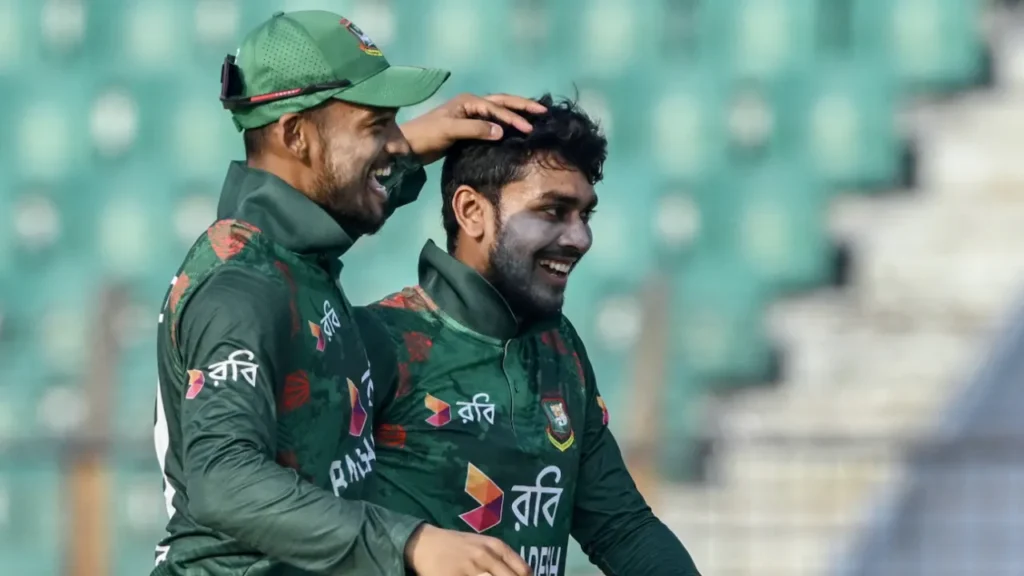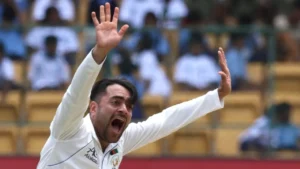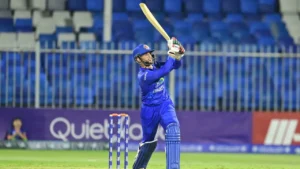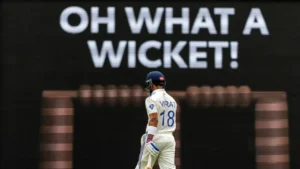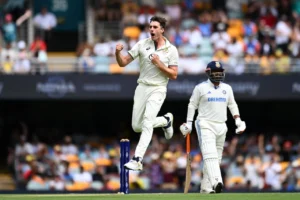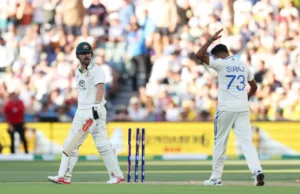In a significant development for Bangladesh cricket, Najmul Hossain Shanto has been confirmed as the captain for the upcoming ODI series against Afghanistan in Sharjah. This decision follows Shanto’s recent discussions with the Bangladesh Cricket Board (BCB), where he expressed his reluctance to continue as the team’s all-format leader.
In this article, we’ll explore what Shanto’s continued leadership means for Bangladesh, the key players shaping the team’s future, and how the squad is evolving ahead of the Afghanistan series and the upcoming West Indies tour.
Shanto Remains Bangladesh ODI Captain for Afghanistan Series
The Bangladesh Cricket Board (BCB) has announced that Najmul Hossain Shanto will remain as the captain for the forthcoming three-match ODI series against Afghanistan in Sharjah. This decision follows a recent conversation between Shanto and BCB president Faruque Ahmed, after which Shanto expressed his reluctance to continue leading Bangladesh across all formats. However, his leadership will remain intact for the Afghanistan series as the team prepares for an important challenge.
For more details on the Afghanistan vs. Bangladesh 2024 series, check the full coverage on Epicinnings.
Shanto’s Leadership Amidst Captaincy Discussions
Shanto’s leadership has been a topic of discussion within the BCB, particularly after he expressed uncertainty about continuing as captain for all formats. His hesitation has led to speculation about future leadership choices. Despite his personal reservations, Shanto’s role remains crucial for the team in the short term.
In his conversation with the BCB, Faruque Ahmed mentioned that the board had considered other players for the leadership role. However, Shanto’s captaincy is set for the Afghanistan ODIs. Faruque also noted that Mehidy Hasan Miraz and Taskin Ahmed were “front-runners” for potential captaincy in the future.
Miraz and Taskin: Potential Future Captains
As Shanto navigates his current leadership role, two players stand out as potential future captains. Mehidy Hasan Miraz, named Shanto’s deputy for the Afghanistan series, has already proven his value both with the bat and the ball. His leadership qualities have been noted, and he is seen as a key figure in Bangladesh’s future plans.
Similarly, Taskin Ahmed, a consistent performer with the ball, is another strong contender. His experience and vocal presence on the field make him a suitable candidate for captaincy. The next few months could see one of these players step up, depending on the team’s performance and leadership dynamics.
Bangladesh’s ODI Squad for Afghanistan Series
The Bangladesh squad for the Afghanistan series is a mix of experience and youth, with a few players returning after a period of absence. One of the most exciting inclusions is Nahid Rana, the 22-year-old tearaway fast bowler, who is the only uncapped player in the squad. Rana’s impressive performances in domestic cricket have earned him a spot, and his raw pace could be a game-changer in the upcoming series.
The squad also includes experienced players like Mushfiqur Rahim and Mahmudullah Riyad, both of whom bring invaluable experience to the team. For a full breakdown of the squad, visit the official squad list.
Key Players to Watch: Zakir Hasan, Nasum Ahmed, and Nahid Rana
Bangladesh’s squad sees the return of a few key players, including Zakir Hasan, the left-handed opener, who has played only one ODI so far but has made a name for himself in Tests. His inclusion could provide the top order with much-needed stability.
Left-arm spinner Nasum Ahmed also returns after featuring in the 2023 World Cup. His ability to contain runs and provide breakthroughs makes him an important part of Bangladesh’s spin attack.
Additionally, Nahid Rana’s inclusion will be closely watched. The young pacer has shown promise with his pace and bounce in domestic cricket, and the Afghanistan series could be his big break.
Shakib Al Hasan and Litton Das Unavailable Due to Injuries
Two of Bangladesh’s key players will miss the Afghanistan series. Shakib Al Hasan, one of the best all-rounders in the world, voluntarily opted out of the series. This decision leaves a significant gap in both the batting and bowling departments.
Litton Das is another major absentee. He missed the Chattogram Test due to fever and will not be part of the ODI squad either. His absence is a blow to Bangladesh’s top order, as Litton has been a reliable run-scorer in all formats.
Player Exclusions: Anamul Haque, Taijul Islam, and Hasan Mahmud
The Bangladesh selectors have also made some difficult choices, with several established players missing out. Anamul Haque and Taijul Islam are notable absentees, with both players failing to make the cut for the Afghanistan series. Hasan Mahmud, an accomplished player, can’t participate due to a shoulder injury during the ongoing National Cricket League.
While these omissions may raise eyebrows, they reflect the selectors’ desire to experiment with fresh faces, such as Nahid Rana and Zakir Hasan.
For a detailed schedule of the Afghanistan series, check out fixtures and results.
What Shanto’s Continued Captaincy Means for Bangladesh’s Future
Shanto’s ongoing captaincy will likely influence Bangladesh’s cricketing direction in the short term. While the team faces challenges with key players absent or injured, Shanto’s leadership could serve as a stabilizing factor.
As the captain, Shanto has the responsibility of guiding a young team through a difficult period. His decisions in the Afghanistan series could have long-term ramifications for the team’s development and future leadership choices.
The Evolution of Bangladesh’s Leadership Dynamics
The evolving leadership scenario in Bangladesh cricket is a reflection of the changing times. With experienced players like Shakib Al Hasan and Mushfiqur Rahim approaching the twilight of their careers, it is crucial for the BCB to focus on the next generation of leaders. This shift will ensure that Bangladesh remains competitive at the international level.
For instance, the emergence of Mehidy Hasan Miraz and Taskin Ahmed as potential future captains shows that the BCB is grooming younger players for leadership roles, ensuring continuity.
Shanto’s Reluctance and the BCB’s Strategic Decisions
Shanto’s reluctance to continue as an all-format captain presents both challenges and opportunities for the BCB. The board will have to navigate these discussions carefully, weighing Shanto’s desire to focus on his batting and the team’s long-term needs.
Despite these concerns, the BCB is committed to making the best decisions for the team’s future. Whether Shanto remains in charge for future series or hands over the baton to someone else, the key is finding a leader who can unite the team and inspire confidence.
Upcoming Bangladesh Tour of the West Indies: What to Expect
After the Afghanistan series, Bangladesh will shift its focus to the West Indies tour in November 2024. The tour will feature two Tests, three ODIs, and three T20Is, providing an excellent opportunity for Bangladesh to test its players in various formats. The squad for the West Indies tour is yet to be announced, but it promises to be an exciting challenge for the team.
The team’s performance against Afghanistan could play a significant role in determining the makeup of the West Indies squad. For more details on the tour, stay tuned for announcements.
Key Fixtures: Bangladesh’s Busy Tour Schedule
Bangladesh’s tour to the West Indies will be packed with high-stakes matches. The schedule is still to be finalized, but the team will need to balance both Tests and limited-overs cricket in a competitive environment. This tour is crucial for the team’s development as they prepare for the 2024-25 season.
Bangladesh’s ODI Series Against Afghanistan: Full Schedule
The three-match ODI series between Bangladesh and Afghanistan is set to take place in Sharjah. The first ODI is on November 6, with the remaining two matches on November 9 and November 11. For more information on the series and match details, check the full schedule here.
To catch live updates and detailed scorecards of the matches, visit the full scorecard for the first ODI.


